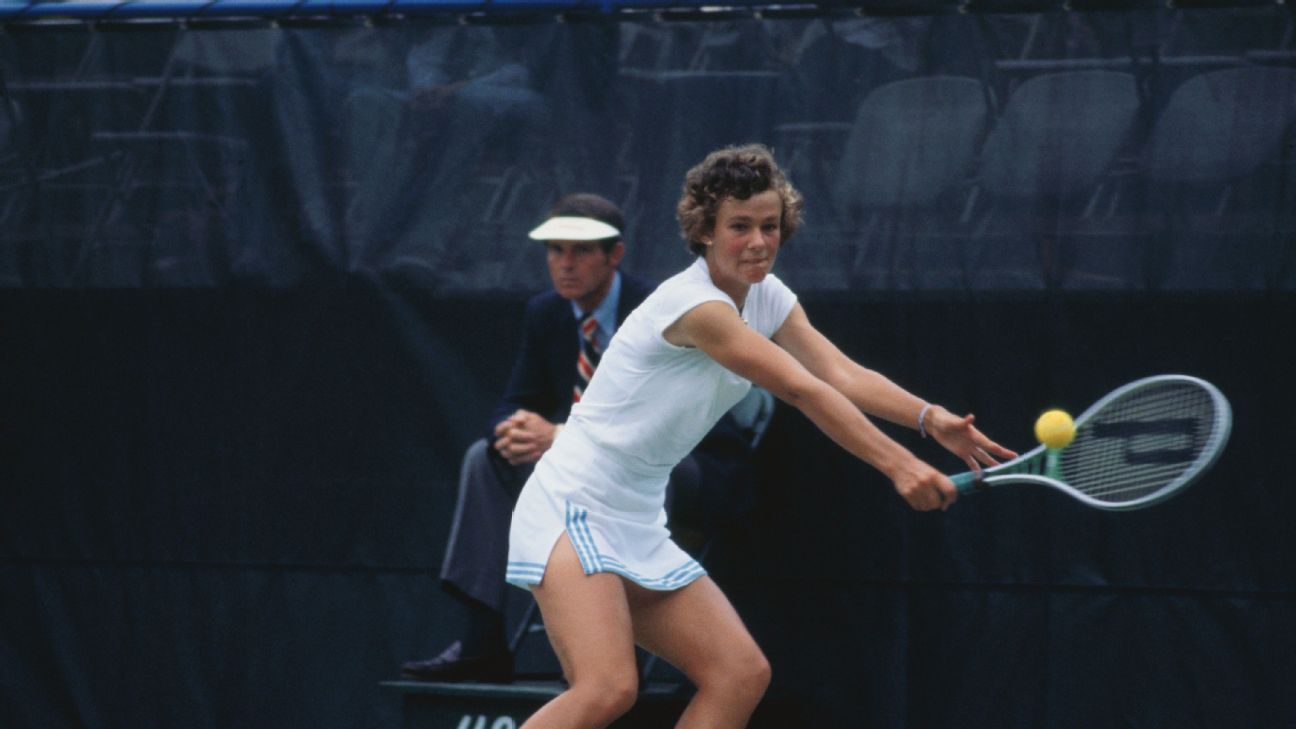ESPN tennis analyst Pam Shriver said Wednesday that she was in what she called “an inappropriate and damaging relationship with my much older coach” that began when she was 17 and lasted for five years.
Shriver, in an interview with ESPN’s Outside the Lines as well as a first-person story and podcast with English publication The Telegraph, said she decided to talk about her relationship with coach Don Candy because “this still goes on — a lot.”
“I believe abusive coaching relationships are alarmingly common in sport as a whole,” she wrote in The Telegraph. “My particular expertise, though, is in tennis, where I have witnessed dozens of instances in my four-and-a-bit decades as a player and commentator. Every time I hear about a player who is dating their coach, or I see a male physio working on a female body in the gym, it sets my alarm bells ringing.”
Shriver, 59, began her professional career in 1978, at the age of 15. She traveled with Candy, who was her coach and chaperone. Shriver reached the finals of the 1978 US Open as an amateur, but never reached another title match in a Grand Slam.
She did win 21 times on the WTA tour in singles, and Shriver won 21 Grand Slam doubles titles between 1981 and ’91, mostly with Martina Navratilova as her partner.
The relationship with Candy, who died in 2020 at age 91, began when Shriver was 17 and became sexual when she was 20, Shriver wrote.
“It was during a time that was a really difficult time for me to have my first relationship,” Shriver told Jeremy Schaap in an OTL interview. “It never should have been with my coach and … I’ve just realized that it’s time to talk about my story and hopefully make it easier for some other people who’ve also had stories that are similar.”
Candy was 33 years older than Shriver. She said he never abused her sexually, but Shriver did say she felt there was emotional abuse. She said, eventually, the affair became an “open secret” on the women’s pro tennis tour.
“I still have conflicted feelings about Don,” Shriver wrote. “Yes, he and I became involved in a long and inappropriate affair. Yes, he was cheating on his wife. But there was a lot about him that was honest and authentic. And I loved him. Even so, he was the grown-up here. He should have been the trustworthy adult. In a different world, he would have found a way to keep things professional. Only after therapy did I start to feel a little less responsible. Now, at last, I’ve come to realize that what happened is on him.”
She said she told her father about the relationship but didn’t tell her mother, who died in August 2021.
“I felt a lot of shame and guilt,” Shriver told OTL. “I felt also a lot of anger, jealousy when his wife would come to tournaments. Um, so it was just basically, at times really miserable.
“And because I was, you know, living the life of trying to be the best tennis player I could be, I really didn’t understand how difficult the secret and the juggling was. And so I just kept it to myself. Some of my close friends eventually learned, but you know what? It was kind of a little bit, I don’t want to say normalized, but I wasn’t the only one. We weren’t the only boundary-crossing relationship on the tour at the time.”
Shriver told OTL she didn’t have an outlet, at the time, to share what was happening.
“At that point, safeguarding measures for young female athletes were like, nonexistent,” Shriver said. “I really didn’t know who to turn to. I kept it a secret from my family. I never kept a secret from my parents of any size except this one. …
“I really didn’t know where to go to and I wasn’t sure how to ask for help. And it really wasn’t until sometime later, like really when the relationship was over, that I realized how much help I did need at the time.”
The WTA on Wednesday issued a statement in response, saying the tour “is dedicated to ensuring a safe environment across our Tour” and that “safeguarding requires vigilance, and we are continuing to invest in education, training and resources to improve our efforts.
“The health and safety of all WTA Tour stakeholders — including the players — is our priority, and our commitment to safeguarding remains resolute.”
Shriver was asked why she is telling her story now.
“Because it’s been over 40 years,” Shriver told OTL. “Most of the time in my life, I just kept moving forward and I never allow myself enough time to kind of think about what had happened then and really how damaging the relationship was, how it hurt my tennis, my performance, how it hurt my ability to form healthy relationships moving forward in my life.
“It really did take a combination of things. The pause of the pandemic, realizing that my kids were of similar age I was when the relationship started. It also took, I think, some reflection when my, my mom died last August. She died, never knowing that this happened. She always thought that I was being chaperoned by a safe person.
“And so, I just feel like it’s time for me. I feel like it’s important for my healing. And it’s important that I can maybe feel that me coming forward and talking about my story in detail, might just help a few young players. Maybe it’ll help coaches to understand that they need to not cross that boundary.
“So I feel like, for a lot of reasons, it’s the right time.”
